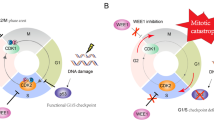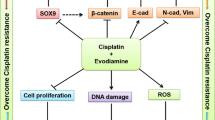Abstract
EGFR tyrosine kinase inhibitors (EGFR-TKIs) are the first-line treatment for EGFR-mutant non-small cell lung cancer (NSCLC) patients, which remarkably improve the clinical outcomes. However, drug resistance has greatly impaired the efficacy of EGFR-TKIs and contributes to cancer treatment failure. DUSP1, a negative regulator of MAPK signaling pathway, was discovered to mediate drug resistance in multiple types of cancers. Our study aimed to explore the role of DUSP1 in NSCLC cell resistance to osimertinib, a third-generation EGFR-TKI. Human NSCLC cell lines PC-9 and HCC827 were exposed to increasing concentrations of osimertinib for over 6 months to generate osimertinib resistant cells (PC-9-OR and HCC827-OR). The viabilities of osimertinib-resistant and parental sensitive NSCLC cells in response to osimertinib stimulation were detected by MTS assay and the IC50 values for osimertinib were obtained. The differentially expressed genes in osimertinib-resistant and sensitive NSCLC cells were identified by analyzing the GEO dataset GSE106765 using bioinformatic tools. DUSP1 expression was knocked down by using the short hairpin RNAs (shRNAs). Then, the effects of DUSP1 silencing on osimertinib-resistant and sensitive NSCLC cell resistance to osimertinib, viability, proliferation and apoptosis were assessed through loss-of-function experiments. The expression of key molecules (JNK, ERK, and p38 MAPK) in the MAPK signaling pathway was detected through western blotting analysis. DUSP1 was overexpressed in osimertinib-resistant NSCLC cells versus parental sensitive cells. DUSP1 silencing attenuated the resistance of NSCLC cells to osimertinib. DUSP1 silencing markedly inhibited osimertinib-resistant and sensitive NSCLC cell proliferation but enhanced cell apoptosis. Mechanically, DUSP1 knockdown increased phosphorylated-JNK, ERK, and p38 MAPK levels in NSCLC cells. Treatment with SB203580, the p38 MAPK inhibitor, reversed the effects of DUSP1 silencing on osimertinib-resistant NSCLC cell resistance to osimertinib, cell proliferation and apoptosis. DUSP1 downregulation restores the sensitivity of NSCLC cells to osimertinib via activating the MAPK signaling pathway.







Similar content being viewed by others
Data Availability
The datasets used or analyzed during the current study are available from the corresponding author on reasonable request.
References
Siegel, R. L. (2021). Cancer Statistics. CA Cancer J Clin, 71(1), 7–33.
Liang, G., et al. (2020). miR-196b-5p-mediated downregulation of TSPAN12 and GATA6 promotes tumor progression in non-small cell lung cancer. Proc Natl Acad Sci U S A, 117(8), 4347–4357.
Hirsch, F. R., et al. (2017). Lung cancer: Current therapies and new targeted treatments. Lancet, 389(10066), 299–311.
Rosell, R., et al. (2009). Screening for epidermal growth factor receptor mutations in lung cancer. New England Journal of Medicine, 361(10), 958–967.
Liu, G. H. (2020). Small molecule inhibitors targeting the cancers MedComm, 2(4), e181.
Maemondo, M., et al. (2010). Gefitinib or chemotherapy for non-small-cell lung cancer with mutated EGFR. New England Journal of Medicine, 362(25), 2380–2388.
Kobayashi, S., et al. (2013). Compound EGFR mutations and response to EGFR tyrosine kinase inhibitors. Journal of Thoracic Oncology : Official Publication of the International Association for the Study of Lung Cancer, 8(1), 45–51.
Ramalingam, S. S., et al. (2018). Osimertinib as First-Line treatment of EGFR mutation-positive Advanced Non-small-cell Lung Cancer. Journal of Clinical Oncology, 36(9), 841–849.
Remon, J., et al. (2018). Osimertinib and other third-generation EGFR TKI in EGFR-mutant NSCLC patients. Annals of Oncology, 29(suppl_1), i20–i27.
Sun, R., et al. (2022). Drug resistance mechanisms and progress in the treatment of EGFR-mutated lung adenocarcinoma. Oncol Lett, 24(5), 408.
Leonetti, A., et al. (2019). Resistance mechanisms to osimertinib in EGFR-mutated non-small cell lung cancer. British Journal of Cancer, 121(9), 725–737.
Liao, Q., et al. (2003). Down-regulation of the dual-specificity phosphatase MKP-1 suppresses tumorigenicity of pancreatic cancer cells. Gastroenterology, 124(7), 1830–1845.
Bermudez, O., Pagès, G., & Gimond, C. (2010). The dual-specificity MAP kinase phosphatases: Critical roles in development and cancer. American Journal of Physiology. Cell Physiology, 299(2), C189–202.
Chu, Y., et al. (1996). The mitogen-activated protein kinase phosphatases PAC1, MKP-1, and MKP-2 have unique substrate specificities and reduced activity in vivo toward the ERK2 sevenmaker mutation. Journal of Biological Chemistry, 271(11), 6497–6501.
Theodosiou, A., & Ashworth, A. (2002). MAP kinase phosphatases. Genome Biology, 3(7), 1–10.
Fang, J., et al. (2018). DUSP1 enhances the chemoresistance of gallbladder cancer via the modulation of the p38 pathway and DNA damage/repair system. Oncol Lett, 16(2), 1869–1875.
Teng, F., et al. (2018). DUSP1 induces apatinib resistance by activating the MAPK pathway in gastric cancer. Oncology Reports, 40(3), 1203–1222.
Kang, Y. S., et al. (2016). DUSP1 induces paclitaxel resistance through the regulation of p-glycoprotein expression in human ovarian cancer cells. Biochemical and Biophysical Research Communications, 478(1), 403–409.
Moncho-Amor, V., et al. (2011). DUSP1/MKP1 promotes angiogenesis, invasion and metastasis in non-small-cell lung cancer. Oncogene, 30(6), 668–678.
Chattopadhyay, S., et al. (2006). MKP1/CL100 controls tumor growth and sensitivity to cisplatin in non-small-cell lung cancer. Oncogene, 25(23), 3335–3345.
Howell, M. C., Jr. (2022). EGFR TKI resistance in lung cancer cells using RNA sequencing and analytical bioinformatics tools. Journal Of Biomolecular Structure & Dynamics, 41(19), 9808–9827.
Edgar, R., Domrachev, M., & Lash, A. E. (2002). Gene expression Omnibus: NCBI gene expression and hybridization array data repository. Nucleic Acids Research, 30(1), 207–210.
Barrett, T., et al. (2013). NCBI GEO: Archive for functional genomics data sets–update. Nucleic Acids Research, 41(Database issue), D991–D995.
Sugano, T., et al. (2015). Inhibition of ABCB1 overcomes Cancer Stem Cell-like Properties and Acquired Resistance to MET inhibitors in Non-small Cell Lung Cancer. Molecular Cancer Therapeutics, 14(11), 2433–2440.
Weinstein, I. B. (2002). Cancer. Addiction to oncogenes–the Achilles heal of cancer. Science, 297(5578), 63–64.
Lynch, T. J., et al. (2004). Activating mutations in the epidermal growth factor receptor underlying responsiveness of non-small-cell lung cancer to gefitinib. New England Journal of Medicine, 350(21), 2129–2139.
Rotow, J., & Bivona, T. G. (2017). Understanding and targeting resistance mechanisms in NSCLC. Nature Reviews Cancer, 17(11), 637–658.
Takahashi, A., et al. (2018). Ankyrin Repeat Domain 1 overexpression is Associated with Common Resistance to Afatinib and Osimertinib in EGFR-mutant Lung Cancer. Scientific Reports, 8(1), 14896.
Liu, R., et al. (2022). STAMBPL1 promotes breast cancer cell resistance to cisplatin partially by stabilizing MKP-1 expression. Oncogene, 41(16), 2265–2274.
Wang, J., et al. (2009). Involvement of MKP-1 and Bcl-2 in acquired cisplatin resistance in ovarian cancer cells. Cell Cycle, 8(19), 3191–3198.
Wang, H., et al. (2019). Interplay of MKP-1 and Nrf2 drives tumor growth and drug resistance in non-small cell lung cancer. Aging (Albany NY), 11(23), 11329–11346.
Huang, J., et al. (2011). Involvement of MAPK phosphatase-1 in dexamethasone-induced chemoresistance in lung cancer. Journal of Chemotherapy, 23(4), 221–226.
Lin, Y. C., et al. (2015). DUSP1 expression induced by HDAC1 inhibition mediates gefitinib sensitivity in non-small cell lung cancers. Clinical Cancer Research, 21(2), 428–438.
Chen, Z., et al. (2020). Long non-coding RNA CASC9 promotes gefitinib resistance in NSCLC by epigenetic repression of DUSP1. Cell Death and Disease, 11(10), 858.
Takahashi, H., et al. (2023). Notch pathway regulates osimertinib drug-tolerant persistence in EGFR-mutated non-small-cell lung cancer. Cancer Science, 114(4), 1635–1650.
Sun, F., et al. (2021). The MAPK dual specific phosphatase (DUSP) proteins: A versatile wrestler in T cell functionality. International Immunopharmacology, 98, 107906.
Sui, X., et al. (2014). p38 and JNK MAPK pathways control the balance of apoptosis and autophagy in response to chemotherapeutic agents. Cancer Letters, 344(2), 174–179.
Lee, S., Rauch, J., & Kolch, W. (2020). Targeting MAPK Signaling in Cancer: Mechanisms of Drug Resistance and Sensitivity. International Journal Of Molecular Sciences, 21(3), 1102.
Kwak, A. W., et al. (2022). Isolinderalactone sensitizes oxaliplatin-resistance colorectal cancer cells through JNK/p38 MAPK signaling pathways. Phytomedicine, 105, 154383.
McGivern, N., et al. (2018). Activation of MAPK signalling results in resistance to saracatinib (AZD0530) in ovarian cancer. Oncotarget, 9(4), 4722–4736.
Yu, S., et al. (2020). ZNF300 promotes chemoresistance and aggressive behaviour in non-small-cell lung cancer. Cell Proliferation, 53(11), e12924.
Chen, H. F., Chuang, H. C., & Tan, T. H. (2019). Regulation of Dual-Specificity Phosphatase (DUSP) Ubiquitination and Protein Stability. International Journal Of Molecular Sciences, 20(11), 2668.
Liu, F., et al. (2014). DUSP1 is a novel target for enhancing pancreatic cancer cell sensitivity to gemcitabine. PLoS One, 9(1), e84982.
Rincón, R., et al. (2016). c-Jun N-Terminal kinase inactivation by Mitogen-Activated Protein Kinase Phosphatase 1 determines resistance to Taxanes and anthracyclines in breast Cancer. Molecular Cancer Therapeutics, 15(11), 2780–2790.
Funding
This work was supported by Hubei Provincial Natural Science Foundation of China (2022CFB951) and the Medical Research Fund of Wuhan Municipal Health Commission (WX21Q14).
Author information
Authors and Affiliations
Contributions
WH were the main designers of this study. WH, PL, QL, JX and LL performed the experiments and analyzed the data. WH and LL drafted the manuscript. All authors read and approved the final manuscript.
Corresponding author
Ethics declarations
Competing Interests
The authors declare that they have no competing interests.
Ethical Approval
Our study did not require an ethical board approval because it did not contain human or animal trials.
Additional information
Publisher’s Note
Springer Nature remains neutral with regard to jurisdictional claims in published maps and institutional affiliations.
Rights and permissions
Springer Nature or its licensor (e.g. a society or other partner) holds exclusive rights to this article under a publishing agreement with the author(s) or other rightsholder(s); author self-archiving of the accepted manuscript version of this article is solely governed by the terms of such publishing agreement and applicable law.
About this article
Cite this article
He, W., Liu, P., Lei, Q. et al. DUSP1 Promotes Osimertinib Drug-Tolerant Persistence by Inhibiting MAPK/ERK Signaling in Non-small Cell Lung Cancer. Mol Biotechnol (2024). https://doi.org/10.1007/s12033-024-01127-4
Received:
Accepted:
Published:
DOI: https://doi.org/10.1007/s12033-024-01127-4




